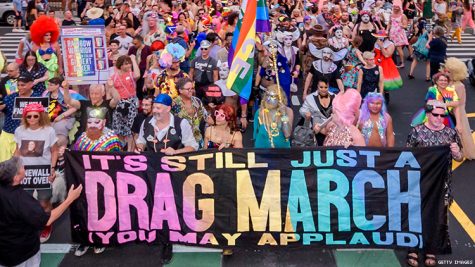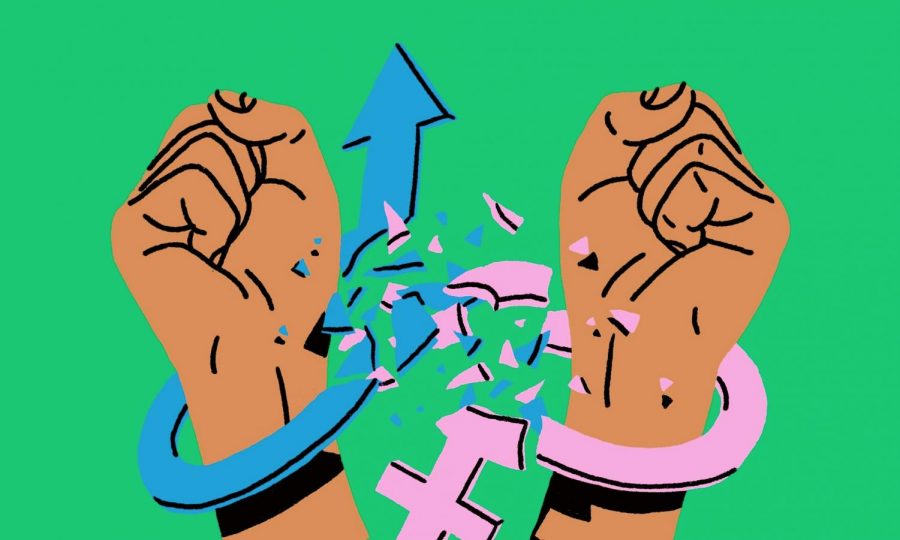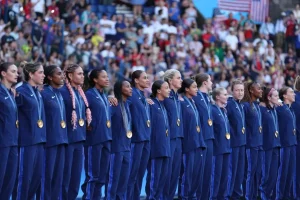Gender Roles: Distracting At Best, Discriminating At Worst
A symbol for the ultimate end-goal: breaking free from gender roles.
November 15, 2021
There have been many instances in my life where my (mostly extended) family has complained about my physique–complaining that I was “too skinny”–with their number one justification for their complaints being that because I was a “young man,” I was “obligated” to be “strong.”
This personal experience of mine is a great example of the disastrous and ludicrous concept of gender labels. While gender is seen as an important aspect for many people’s identities, some people have taken it too far, using gender as the key factor that dictates how a person should look, how they should act, and the decisions they should be expected to make.
The biggest issue with gender roles is that they often steer people away from the true problems at hand, and when those people try to “fix” said problems, they do it through a completely incorrect lens–letting gender labels guide them instead of a simple willingness to solve an issue.
One troublesome gender stereotype has to do physique. A major example is the topic of weight and obesity.
An article written by Danielle X. Morales–who works in the Department of Sociology and Anthropology, University of Texas–and published on August 6th, 2019, reported that “women are more likely to be perceived as fat than men,” and that “among people that are obese, men are more likely to construct a positive body size identity than women.”
But why though? The problem here is obesity and its detrimental, long-term effects it can have on a person’s health. Gender shouldn’t have anything to do with this, so why is one gender receiving more judgement than another? Once again, the culprit is gender roles.
Even from a young age, children are fed the idea that they should physically look a certain way according to their gender identity. According to Morales, “among children, thinness is the norm for girls, but it is undesirable for boys.”
Young girls receive pressure at an early age to maintain thinness, while boys are actually pushed to avoid thinness. With gender-related expectations being forced onto children at such a young age, it’s no wonder that females are scrutinized more for “looking fat” and being obese, while males have an easier time avoiding such scrutiny.
Obesity is indeed an issue that needs to be addressed, but judging people for it because of their gender (or even judging people at all for that matter), is not going to solve anything. The problem at hand is the health risks that come with obesity, and it applies to all people, not just females. Focusing on gender roles will only create unnecessary discrimination on top of all the hatred and harassment that people with obesity already have to face.
Physical stereotypes are problematic indeed, but gender labels that are placed on behavioral expectations also need to be addressed. A scenario that I–and perhaps others–have experienced many times is what I like to call, “door-holding expectations.”
There have been times where people–particularly those who would be considered as my “superiors”–have criticized me for not holding doors for women and girls. But when I forget to hold doors for anyone who does not identify as female, they say nothing.

If someone is going to condemn someone over not making a polite decision, then bringing up gender would be completely irrelevant. The bottom line should be showing politeness for another person–perhaps in hopes of creating a kinder and more selfless society–not fitting the gender norms and pleasing society’s expectations.
Finally, even when there isn’t a major problem to deal with, gender roles still find things to file unnecessary complaints on. For example, a type of entertainment that has increased in popularity in recent years is drag.
Drag is commonly seen as a performance where a person of one gender overtly exaggerates and characterizes themselves with commonly stereotyped traits of another (or sometimes the same) gender
However, according to the National Center For Transgender Equality, “drag performers can experience discrimination and harassment because of their gender expression.” (It is also important to note that being a drag performer is not interchangeable with being transgender.)

If someone wants to present themselves in a certain way–whether it is for a performance or not–they should have every right to do so. Just because a person identifies as a certain gender doesn’t mean they have to wear clothing that society deems as “normal” for said gender. It’s just an oversized piece of cloth after all, who cares who wears it?
Gender labels simply need to go. It’s high time for the world to stop obsessing over stereotypical gender roles and focus on the real challenges that need to be solved. Even if there aren’t any challenges, there’s still no benefit in complaining about how a person doesn’t look or act the way that is usually associated with their gender identity.














Mona Dearling • Nov 29, 2021 at 10:06 am
Aright this outrageous, first off boys and girls are biologically different for example males have more testosterone that makes them stronger therefore it is commonly perceived that men are stronger than women. Granted this does not mean we should acted like women are weak, it’s just a generalization.